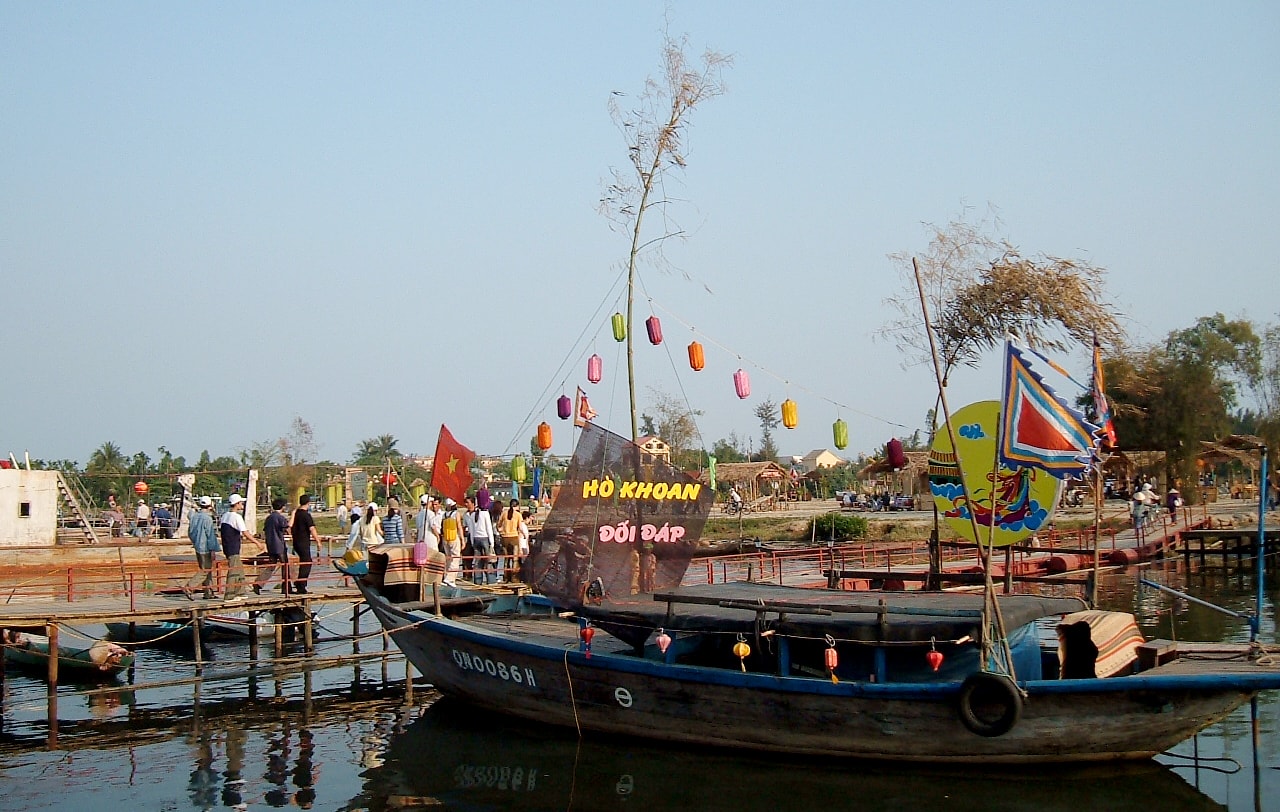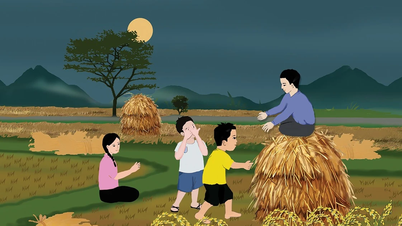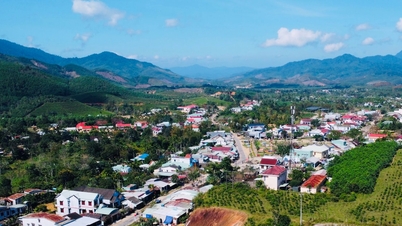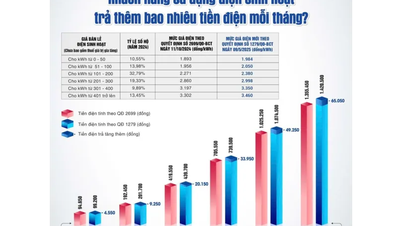
"Too young"
One day in late October 1970, from Quang Ngai to Tam Ky and Thang Binh, and then being besieged by a huge flood, researcher Trang Thien had to sit and wait for the water to recede at an acquaintance’s house. At that time, he happened to hear a local person hum: “Quang Nam land is soaked without rain/ Hong Dao wine is intoxicating without a sip…”.
He recounted this memory in the essay “Rain and Poetry”, written 2 years later. Of course, the verse he just quoted has a slight difference between the words “had” and “da”. Because later, many researchers believed that the word “da” was still circulated among the people. The word “da” is more valuable and includes “had”, “dang”, “sheng”. But that is a variant aspect, which will be mentioned in the following paragraph.
The important story that author Trang Thien wants to share is when he realized that these two familiar folk songs were borrowing the national poetic form, the Vietnamese seven-word verse form. With the 3-2-2 rhythm and ending with an even beat, he excitedly said that the folk song from Quang "definitely refused to coexist with the Chinese seven-word verse" which originally had a 2-2-3 rhythm.
As for me, when reading Trang Thien's essay, I vaguely see the story of age. Because after citing the Vietnamese seven-word folk song "The green buds of the moon bloom/ I regret having a husband", Trang Thien commented: "The first pair (ie the folk song "Quang Nam land..." - NV) must have been born after the founding of Quang Nam, it is a young folk song. The next two sentences and countless similar folk songs, who knows when they appeared? Has the Vietnamese seven-word form lived with us for a thousand years? Or two thousand years?" (Rain and Poetry - excerpt).
“Must have been born after the founding of Quang”, surely he was referring to the historical milestone of 1471? Because according to history books, in June 1471, King Le Thanh Tong, after pacifying the Champa, established the 13th imperial province named Quang Nam.
“Dai Viet Su Ky Toan Thu” also clearly states that at that time, Quang Nam established 3 ty, including Do Ty, Thua Ty, Hien Ty… When writing the essay “Rain and Poetry”, the time difference was more than 500 years, yet the author Trang Thien still said that the folk song of Quang was “still young”, perhaps wanting to compare it with the songs that appeared thousands of years before.
Grateful Heart
But strangely, the "still young" folk song just mentioned is ranked in the list of songs with the most variations, meaning the next two verses are different in addition to the first two verses.
Among the nearly 400 lyrical folk songs of Quang Nam that have been collected, Professor Truong Dinh (University of Science - Hue University) calls this "a strange folk song of Quang Nam". He does not want to use the word "different version" but calls it "variant", citing 12 variations to prove it and saying that "that is what we need to think about".
Researcher Nguyen Van Bon (Tan Hoai Da Vu) when researching the folk literature of Quang Nam - Da Nang in the delta region also quickly collected in detail and fully these 12 versions, relatively classifying 9 lyrical versions and 3 versions reflecting history.
In the 9 lyrical versions, he recognized 3 verses from the Thua Thien Hue region. There is even a version that is believed to be associated with the event of Governor Hoang Dieu committing suicide while defending Hanoi citadel in 1882. The old villagers in Dien Ban passed down the song (following the 2 verses "Quang Nam land has not yet rained but is already soaked / Hong Dao wine has not yet been tasted but is already intoxicating): "The hero hands over a piece of silk / Who knows whether the country is full or empty?".
There is another version that was born during the Duy Tan movement that started in the early 20th century (…When you go back, don't sleep, put your arms down/ Wherever you go, I am grateful for your kindness), or written after the 1954 Geneva Agreement (…The love of the country and mountains has lasted for so many days/ The moon in the North is full of longing).
Many changes have occurred since the song was passed down through generations, but if we count the “age”, it is not too different. Researcher Nguyen Van Bon also mentioned the historical milestone of 1471 when speculating about the time of its birth, saying that “it probably appeared a long time ago, after Quang Nam became a new land on the map of the Fatherland of Vietnam”.
That familiar folk song associated with the place name Quang Nam was later included by musician Phan Huynh Dieu at the beginning of the song "Quang Nam Yeu Thuong" through a folk song.
Musician Phan Van Minh (author of “The Whole Family Loves Each Other”) looked deeply into “Quang Nam Love” to realize that the song had enough “flavor” to express the feelings for the land and people of Quang Nam. Because “Quang Nam Love” has the Nam Ai mode, the melody of the song “Ly tang tit”, the melody of “Ho cheo thuyen” (on the river)… and simple, rustic lyrics.
*
* *
On the journey to the South, our ancestors stopped at the time marker (1471) and gave birth to a land like Quang Nam, and then that place name entered the songs. Over time, it was the familiar songs that "anchored" that place name into traditional music and folk memories.
Even when the boat of time sets sail, the old land and village names are still retained and forever carried in the old songs. As the poet Xuan Dieu once wondered “who brought the analysis of a scent”, perhaps there is no need to sit and count the ages, but to give that song a grateful heart.
Source: https://baoquangnam.vn/dem-tuoi-mot-cau-ca-3154504.html



![[Photo] General Secretary To Lam arrives in Minsk, begins state visit to Belarus](https://vphoto.vietnam.vn/thumb/1200x675/vietnam/resource/IMAGE/2025/5/11/76602f587468437f8b5b7104495f444d)
![[Photo] General Secretary To Lam meets and expresses gratitude to Vietnam's Belarusian friends](https://vphoto.vietnam.vn/thumb/1200x675/vietnam/resource/IMAGE/2025/5/11/c515ee2054c54a87aa8a7cb520f2fa6e)
![[Photo] General Secretary To Lam concludes visit to Russia, departs for Belarus](https://vphoto.vietnam.vn/thumb/1200x675/vietnam/resource/IMAGE/2025/5/11/0acf1081a95e4b1d9886c67fdafd95ed)


















![[Photo] National Assembly Chairman Tran Thanh Man attends the Party Congress of the Committee for Culture and Social Affairs](https://vphoto.vietnam.vn/thumb/1200x675/vietnam/resource/IMAGE/2025/5/11/f5ed02beb9404bca998a08b34ef255a6)
































































Comment (0)